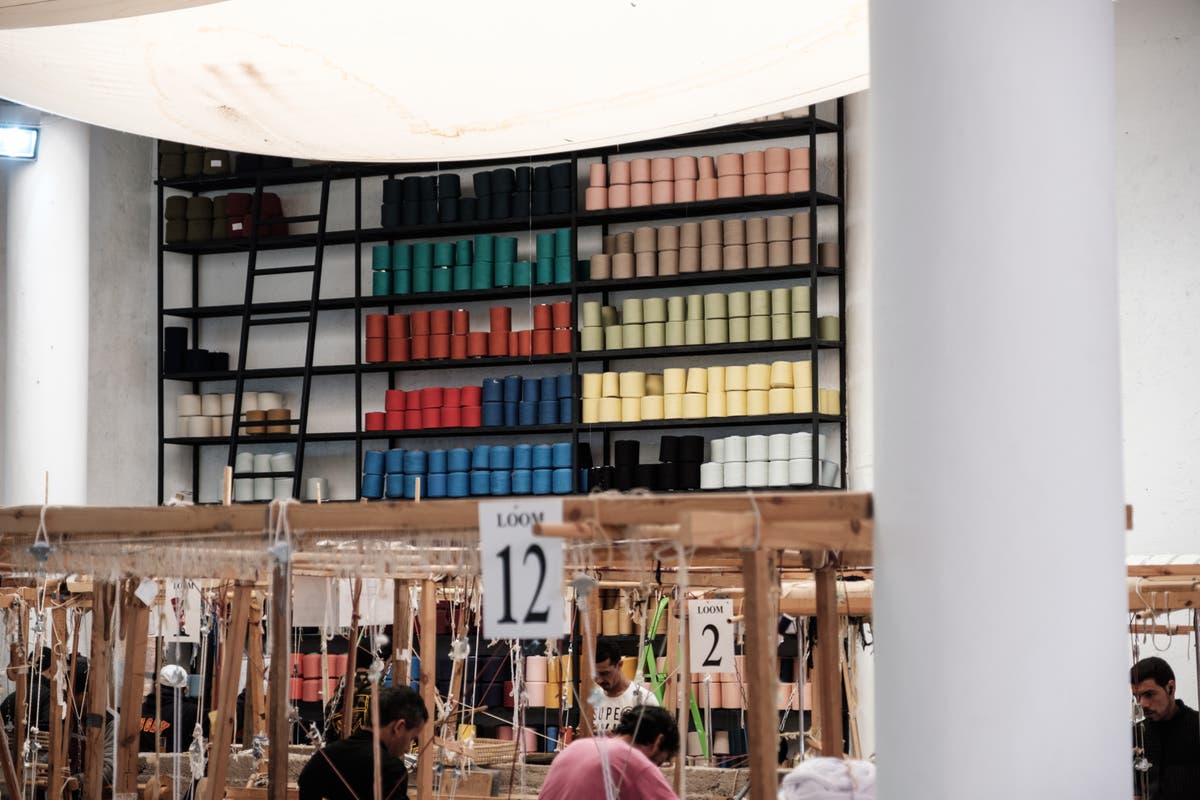Actress to F&B entrepreneur: Lydia Izzati on building a successful pan-fried satay business
The celebrity entrepreneur started her own pan-fried satay business at age 26, inspired by her own parents' butchery stall.
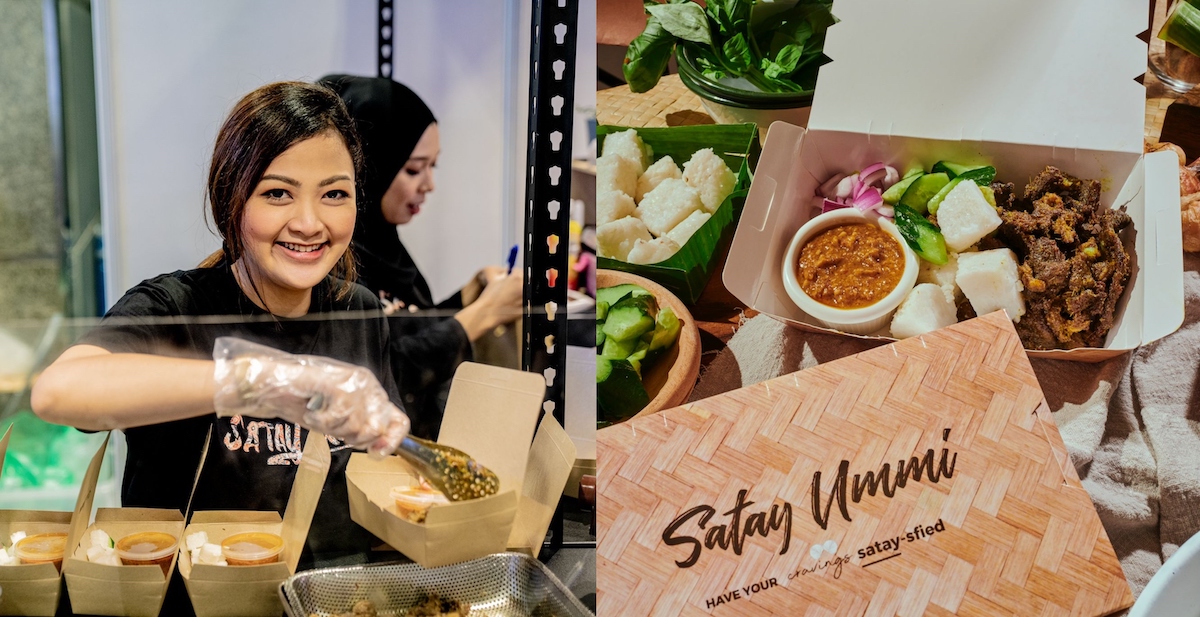
In the bustling food scene of Singapore, where new trends and innovative concepts emerge constantly, one small business stands out for its commitment to preserving tradition and serving authentic flavours.
Satay Ummi, a homegrown venture specialising in satay goreng (pan-fried satay), has captured the hearts and palates of many with its delicious offerings.
Founded by Lydia Izzati, a local actress with a passion for entrepreneurship, Satay Ummi has become a beloved brand among the Malay community with a steady 15,000-strong following on Instagram.
The 31-year-old’s journey as an entrepreneur started when she was still working in the tourism industry, where she worked in hotels and travel agencies. On the sidelines, she would assist her parents at their butchery stall, which had been operating for over two decades now.
The inception of Satay Ummi can be traced back to Lydia’s parents. They took in orders for satay goreng during the festive season due to increasing demand from regular customers, and Lydia would lend a hand in the preparations year after year.
Driven by a desire to break free from the constraints of a 9-to-5 job, Lydia decided to embark on her own entrepreneurial venture.
Moving from online to offline
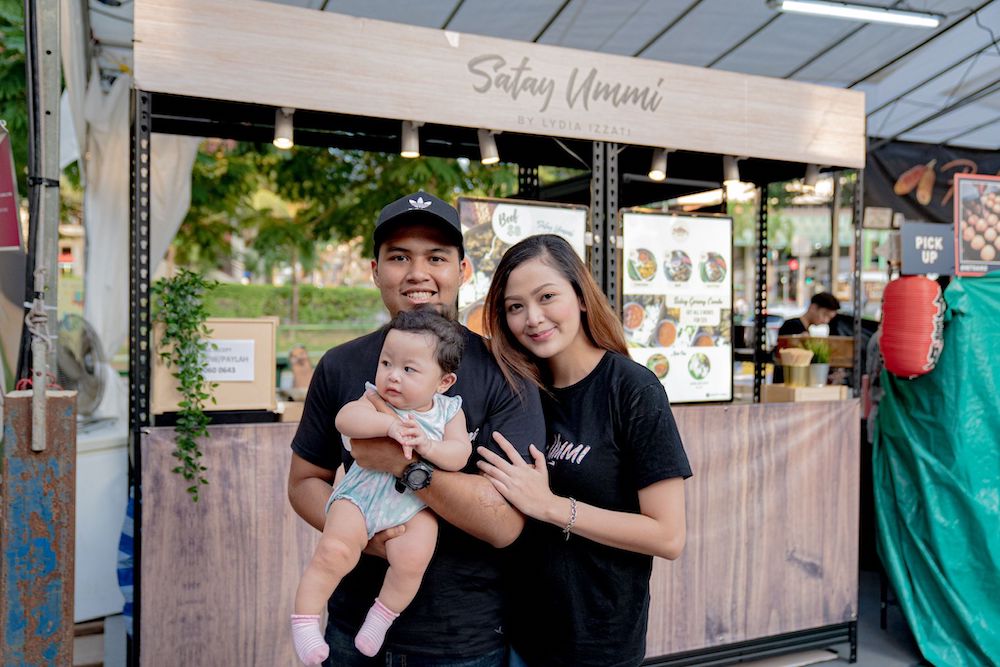 Lydia Izzati and her husband Zaki Affandi, together with their firstborn / Image Credit: Satay Ummi
Lydia Izzati and her husband Zaki Affandi, together with their firstborn / Image Credit: Satay Ummi
I remember telling my husband that I wanted to quit my job and start something, but I don’t know what yet. So I was just trying to figure things out, and that’s when the idea of selling satay goreng struck me.
I also knew at that point of time that my parents also wanted to stop selling satay goreng because making it from scratch was very tiring and troublesome.
– Lydia Izzati, founder of Satay UmmiSeizing the opportunity, she decided to take over the reins, refine the recipe, and rebrand it as Satay Ummi.
One distinctive aspect of Satay Ummi is the involvement of both Lydia’s mother and mother-in-law in the culinary process. Lydia’s mother contributed the original satay goreng recipe, while her mother-in-law — she used to work in restaurant alongside chefs — played a crucial role in the food’s quality control.
Notably, she helped develop Satay Ummi’s signature peanut gravy. As such, the name “Satay Ummi” is a heartfelt tribute to both mothers, as “Ummi” means mother.
Lydia launched the business as a home-based operation in 2018, initially catering to online orders through Instagram.
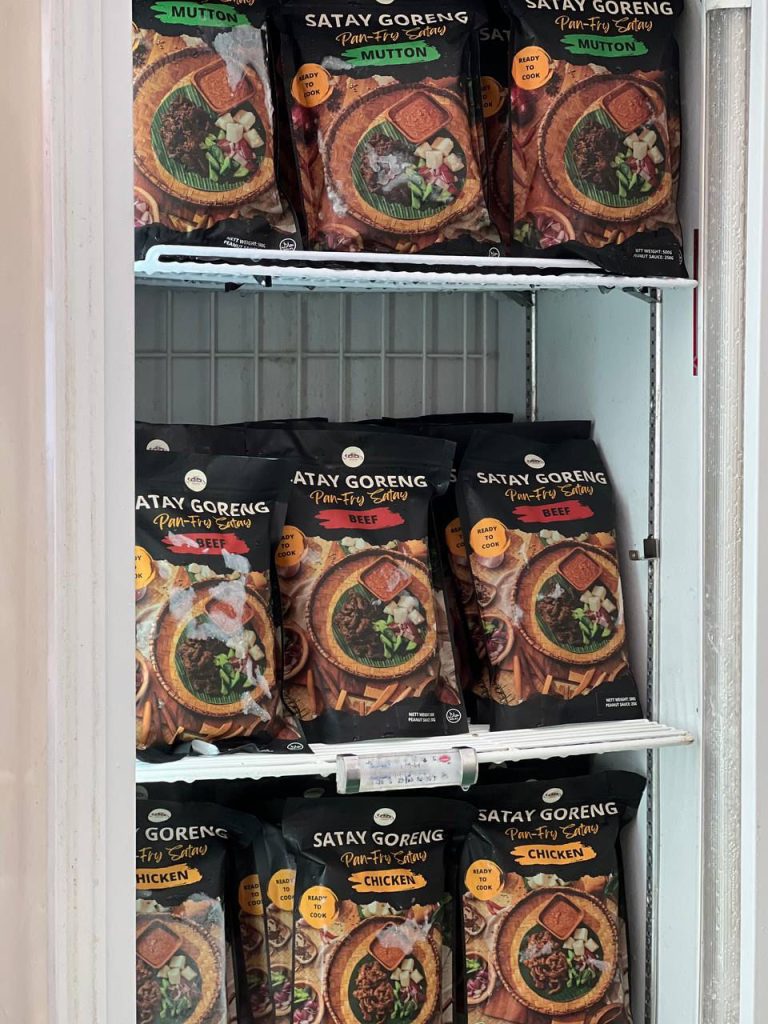 Satay Ummi’s frozen satay goreng / Image Credit: Satay Ummi
Satay Ummi’s frozen satay goreng / Image Credit: Satay UmmiWithin a few months, Lydia’s ambition grew and she set her sights on expanding Satay Ummi’s physical presence. She started participating in pop-up events every one to two months, where she would sell cooked satay goreng instead of the frozen variety.
Together with her husband Zaki Affandi, who hails from the marine industry, they navigated the challenges of running the F&B business together without any relevant knowledge and experience, or a mentor to guide them.
In the early days, the couple juggled multiple roles — her husband would be the one frying the satay goreng, while Lydia would be in charge of taking in orders and serving customers. Now, Lydia mostly handles the marketing aspects while her husband oversees the business operations.
She lost five figures due to COVID
Starting a business at the age of 26 came with its fair share of challenges for Lydia.
As a young entrepreneur in a traditional food industry dominated by seasoned veterans, she shared that she initially faced skepticism.
However, Lydia’s perseverance and commitment to quality gradually won over customers, establishing Satay Ummi as a top choice for authentic satay goreng.
What sets Satay Ummi apart from others is the convenience and speed of the pan-frying method, which is a huge advantage when selling at food events. While others focused on skewered satays that required grilling, Satay Ummi provided a hassle-free alternative that could be quickly prepared and served.
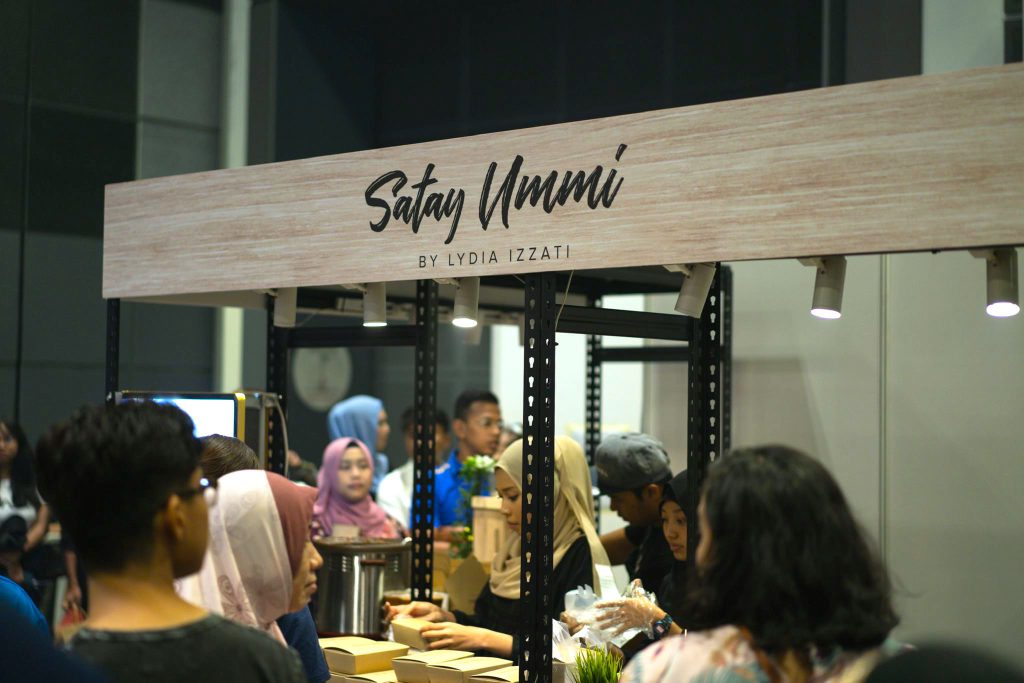 Satay Ummi booth at Twilight 2019 / Image Credit: Satay Ummi
Satay Ummi booth at Twilight 2019 / Image Credit: Satay UmmiAs such, Satay Ummi quickly gained popularity and garnered positive attention, leading to participation in prominent pop-up events such as CelebFest, Twilight, and the Geylang Serai Ramadan Bazaar.
Our base rental for Geylang was S$15,000 for the month-long bazaar (36 days to be exact), but including electrical fees et cetera, it is bumped up to S$18,000. The rental isn’t as high as some other vendors because our booth was not located in a prime spot.
Although Satay Ummi has been around for five years, this is the first time we joined the Geylang Bazaar. The rental is a bit on the high side, but I don’t think it’s excessive. For comparison, CelebFest charged us S$3,000 for three days — that’s essentially S$1,000 per day. Geylang Bazaar’s daily rental was half of that.
– Lydia Izzati, founder of Satay Ummi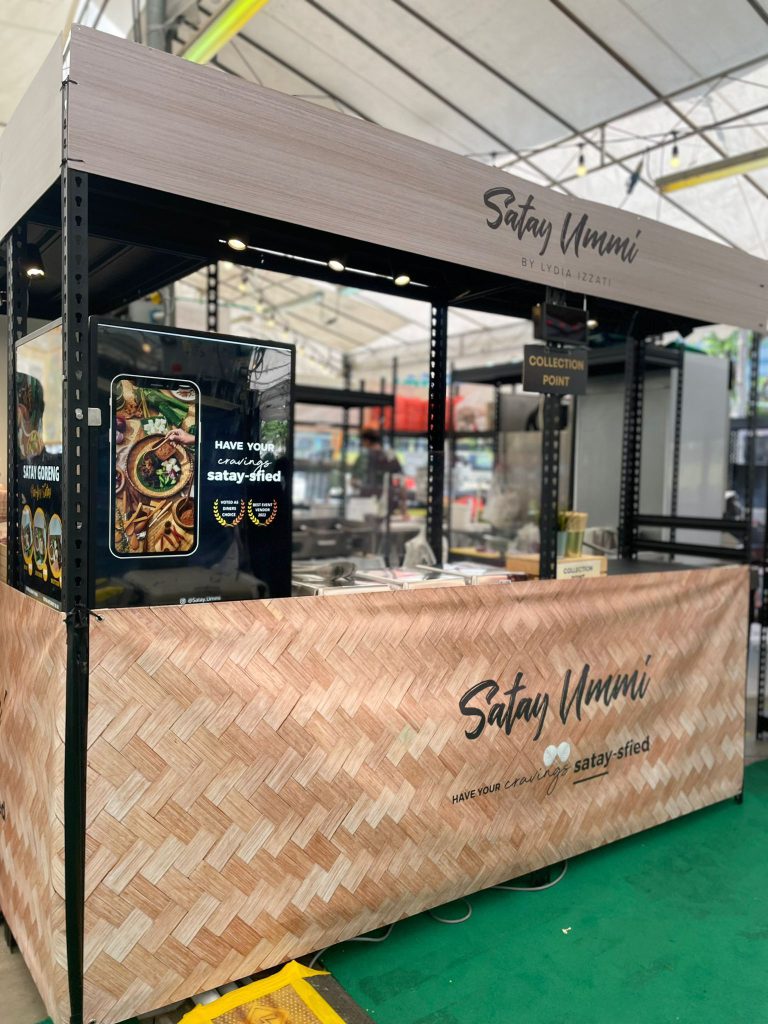 Satay Ummi booth at Geylang Serai Ramadan Bazaar 2023 / Image Credit: Satay Ummi
Satay Ummi booth at Geylang Serai Ramadan Bazaar 2023 / Image Credit: Satay UmmiHowever, she felt that her virgin Geylang bazaar experience was marred by high rental fees and negative media coverage, which affected footfall. Regardless, she was satisfied that they are able to make a profit despite the circumstances.
Additionally, the COVID-19 pandemic also presented unprecedented challenges for Satay Ummi, as it did for countless businesses worldwide.
Lydia recounted the struggles they faced when she had just signed a lease for a central kitchen, only for the annual Geylang Bazaar to be cancelled and a nationwide lockdown to be imposed two weeks later.
The team had to adapt quickly, focusing on online orders during the circuit breaker period to keep the business afloat.
For that one month of circuit breaker, business was good because everyone stayed home and it pushed online orders. We were also able to put the central kitchen to good use.
However, when dining restrictions eased and people were allowed to dine out, sales slowed down and events were still banned. We could only rely on our bento orders, but how much can it sustain to pay for our overheads and central kitchen?
– Lydia Izzati, founder of Satay UmmiEventually, it became apparent that sustaining the business with the central kitchen was no longer viable, leading to the difficult decision to prematurely terminate their contract, have their security deposit forfeited, and sell off their equipment.
When circumstances improved the following year, they secured a shopfront stall at Eatbox by Artbox at Tekka Place for six months as a temporary measure, allowing them to gauge the market before committing to a permanent physical store.
The initial months brought excitement and media coverage, but the ongoing dining restrictions posed challenges. Faced with mounting financial pressures, Lydia resolved not to bleed any more money and give up the stall.
“In total, I lost about five figures due to COVID,” she remarked. “Every year, there has always been challenges, but we treat it as a lesson and an opportunity for growth.”
To her, Satay Ummi is more than just a business venture — it’s also a platform for her to give back to her loved ones.
She explained that Satay Ummi serves as a bridge, providing job opportunities to family and friends in need and sourcing meat supplies from her parents’ butchery stall. In this way, the business not only thrives, but also supports and strengthens family ties.
Being a celebrity entrepreneur is a “double-edged sword”
Lydia’s journey as a celebrity entrepreneur, given her status as a local actress, had its advantages and disadvantages.
As a local actress, I don’t deny that my celebrity status helped to boost the popularity of the brand, but it’s also a double-edged sword. Yes, in a way, I have it easier in starting up my business because the marketing is amplified through my platform and connections with my influencer friends, but people are also more critical of my products and service.
Although I’m a celebrity entrepreneur, I’m not just lending my face and name as part of the company’s branding. I am actually very hands-on and involved in my business, and I put in hard work to start it up from scratch.
– Lydia Izzati, founder of Satay Ummi Satay Ummi’s satay goreng / Image Credit: Satay Ummi
Satay Ummi’s satay goreng / Image Credit: Satay UmmiSharing future business plans, Lydia said that Satay Ummi is currently in the midst of revamping its operations, with plans to move into a central cloud kitchen to handle larger orders. To put things in perspective, their order volume during festive seasons usually jump by two or three times higher.
Lydia also envisions expanding their presence by venturing into live stations and catering to corporate events, which are all currently in the pipeline.
She also acknowledges that some naysayers might say that they lack innovation because they don’t diversity their product offerings and introduce new flavours, but she stresses that they pride themselves in serving authentic satay goreng. “If it’s not broken, why fix it?” she quipped.
Recognising the fiercely competitive nature of the F&B industry, Lydia said that Satay Ummi is focused on maintaining low overheads while delivering exceptional food quality.
As an F&B business, our food obviously needs to be good. So when people think of satay goreng, Satay Ummi is at the top of their minds. As long as we make the customers happy with good food and good customer service, they will keep returning and help spread word about the business.
– Lydia Izzati, founder of Satay UmmiIn addition to Satay Ummi, Lydia and her husband has since ventured into a new business called Maidex, a maid agency aimed at serving the needs of busy young couples early this year.
Recognising a gap among the Malay community, the couple decided to revolutionise the traditional way of finding domestic help. By streamlining and digitalising the maid application process, they hope to provide a seamless and efficient experience that caters to the time-starved lifestyle of busy, young couples.
“Maidex aims to provide convenience by allowing online maid selection and interviews, so there’s no need for them to physically head down to an agency. We will also help settle all the necessary paperwork and send the maid to your house at your preferred day,” she explained.
As she embarks on a new venture, Lydia emphasises that starting a business is “not for the weak-hearted”. In fact, it demands a strong mindset, preparedness for setbacks, and unwavering dedication.
As Satay Ummi continues to evolve and grow, Lydia’s story stands as an inspiration for aspiring entrepreneurs and a reminder of the rewards that await those who dare to pursue their dreams.
Featured Image Credit: Satay Ummi

 ShanonG
ShanonG 











